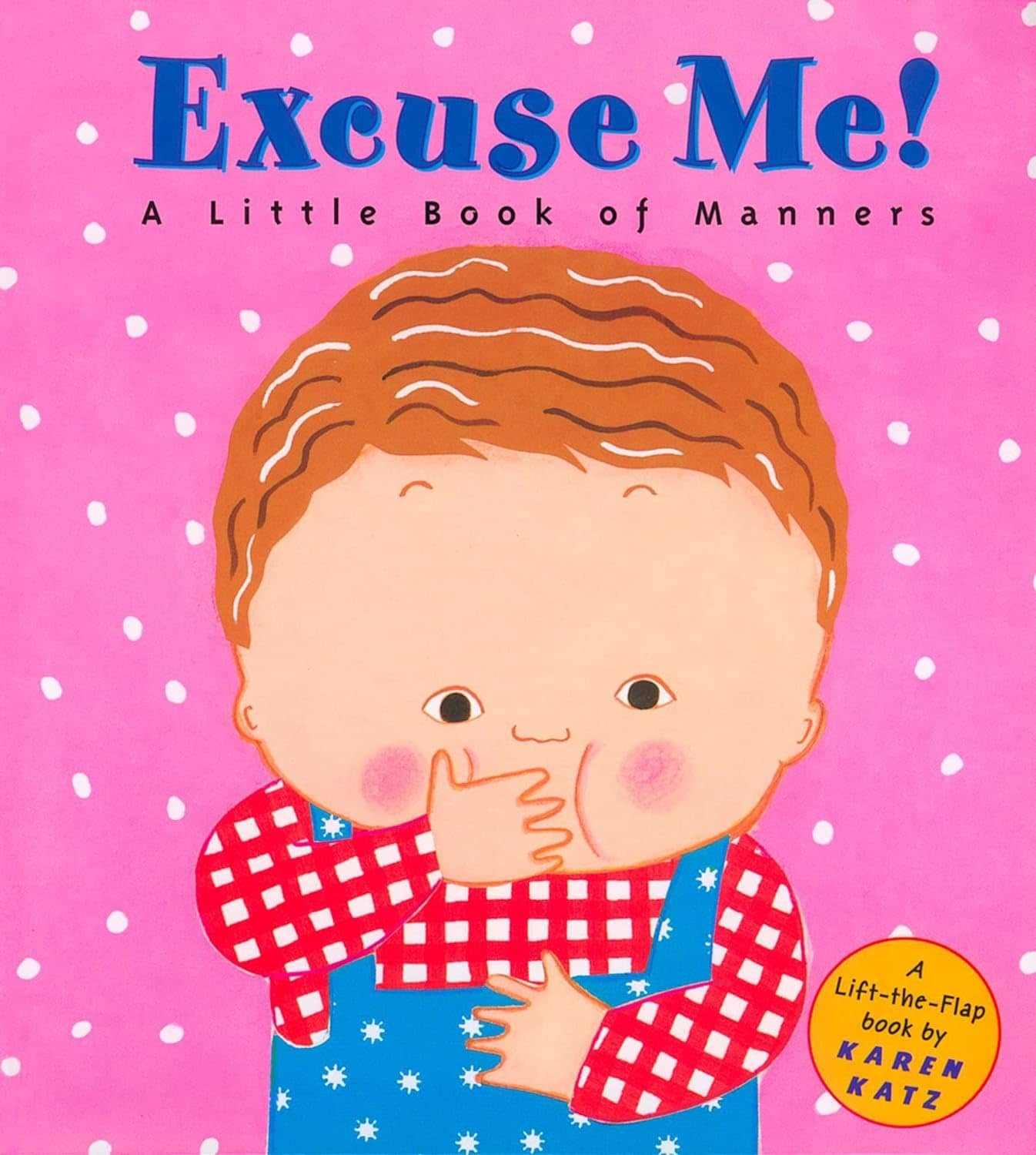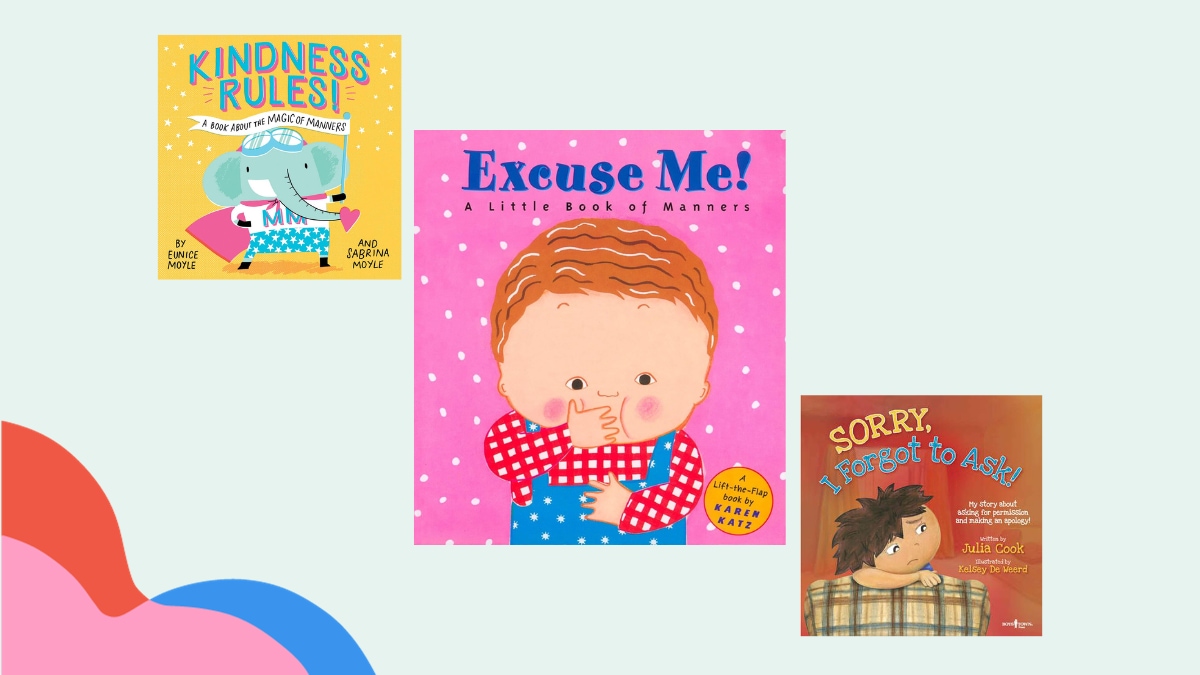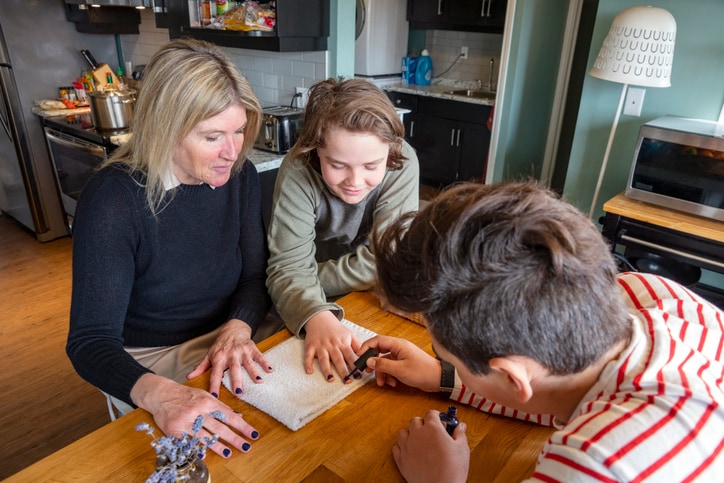When it comes to teaching kids good manners and respectful behaviors, there are a few ground rules that are always helpful: 1) Model the behavior you want children to exhibit, and 2) use fun, engaging books to teach them.
There are so many remarkable books that teach manners and positive behaviors just for kids. So whether you’re working getting kiddos to say “please” and “thank you” or moving into to tougher territory around managing and expressing difficult feelings, check out this list children’s books about manners and more.
Books about basic manners for kids

- “Kindness Rules!” by Sabrina Moyle: A wonderful starter on manners, this board book and Magic the elephant teach the littlest kids how easy and fun manners can be.
- “What If Everybody Did That?” by Ellen Javernick: It’s hard for children to identify how to behave in different social situations, and this book does a good job of teaching these concepts.
- “Excuse Me: A Little Book of Manners” by Karen Katz: It’s important to not only model good manners but teach situations in which to use manners. This book does a great job of being repetitive and providing examples for when to use expressions like “thank you” and “excuse me.”
Kids books for dealing with physical aggression
Sometimes issues of hitting and biting come up once children get their first sibling or start school. It’s part of children figuring out how to express their feelings and can definitely be tricky for parents and caregivers.
- “Teeth Are Not for Biting” by Elizabeth Verdick: Sooner or later almost all children will either bite another child or be bitten when in school. It’s something parents don’t realize is incredibly common. It’s important to work through this book to help prevent biting.
- “Hands Are Not for Hitting” by Martine Agassi, PhD: Children need to learn that violence is never OK, and if you see kids hitting, talking to them about it and reading this book with them is a good first step.
Kids books about sharing and teamwork
As children progress in school, being able to interact in a positive way is incredibly important. They’ll need to be able to share and cooperate with their classmates.
- “Llama Llama Time to Share” by Anna Dewdney: Sometimes children can have feelings of not wanting to share and keep things to themselves. Kids can really engage with the Llama character.
- “Sorry, I Forgot to Ask!” by Julia Cook: It’s hard to understand that part of sharing and being in school means asking for permission to borrow and share things. This book talks about concepts of “yours” and “mine.”
- “Teamwork Isn’t My Thing, and I Don’t Like to Share!” by Julia Cook: The art of sharing is a difficult one to master, and sometimes kids don’t really understand the benefits. This book teaches that sharing and working with other kids can actually be fun.
Books about friendship for kids
Friendships are incredibly hard. It’s not just about sharing toys and bikes; making friends can also mean learning to interact with others who may feel and think differently and even navigating types of bullying. It can be really tough!
- “How to Lose All Your Friends” by Nancy Carlson: What’s nice about this book is that it shows both “good” and “bad” social behavior and what it actually takes to make friends.
- “The Recess Queen” by Alexis O’Neill: Schoolyard bullying is something that’s common among kids unfortunately. This book teaches children about recess dynamics, bullying and how to handle bullying.
- “How to Be a Friend: A Guide to Making Friends and Keeping Them” by Laurie Krasny Brown: Even as adults, we can really struggle with understanding friendships, and this book shows children how to be a friend and ways not to be a friend.
Feelings books for kids
Adults have a hard time understanding and interpreting their own feelings, so doesn’t it make complete and total sense that children would have an equally or more difficult time?
- “Today I Feel Silly: And Other Moods That Make My Day” by Jamie Lee Curtis: This is a particularly good book for helping children understand that feelings can change each day and even multiple times in a single day.
- “Glad Monster, Sad Monster” by Ed Emberley: Honestly, this book is just really cool because it’s interactive and has incredibly bright and engaging images.
- “Feelings to Share From A to Z” by Todd Snow: There are so many feelings covered in this book, everything from feeling shy and yucky to wishful.
- “The Way I Feel” by Janan Cain: This book really gets into expressing feelings, which is such an important thing for children to be able to understand and know how to do from an early age. The inability to do so can cause so many problems later in life.
Books about anger for kids
Feelings of anger can be incredibly hard to explain to kids. They get frustrated because they feel angry, but they don’t always understand the feeling itself.
- “Zach Gets Frustrated” by William Mulcahy: What’s great about this book is that it teaches skills for dealing with frustration around everyday situations that most children can be irritated by — and doing so productively.
- “Cool Down and Work Through Anger” by Cheri J. Meiners, M.Ed: An exercise book that tells children it’s OK to feel angry, but it’s not OK to act out and say rude or mean things as a result of those feelings.
- “When I Feel Angry” by Cornelia Maude Spelman: The situations in this book are highly realistic, so it’s easy for kids to relate to those situations and then say internally, “OK, when I experience this, I should react this way”
- “When Sophie Gets Angry — Really, Really Angry…” by Molly Bang: This is a particularly good book for siblings who become irritated with one another, as one of the main parts of the book discusses how sometimes siblings irritate us.






